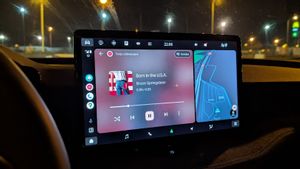JAKARTA - As a member of the secretive Senate Intelligence Committee, Senator Angus King has reason to worry about hackers. At a briefing by security staff this year, he said he got some advice on how to help keep his phone safe.
Step One: Turn off the phone.
Step Two: Turn it back on.
In a time of pervasive digital insecurity, it turns out that the oldest and simplest computer repair one can do is to turn off the device and then turn it back on. If this is done then it can thwart hackers from stealing information from smartphones.
Rebooting phones regularly will not stop the army of cybercriminals or spy companies that have sown chaos and doubt about the ability to keep any information safe and private in our digital lives. But it can make even the most sophisticated hackers work harder to maintain access and steal data from the phone.
"It's all about imposing costs on these bad actors," said Neal Ziring, technical director of the National Security Agency's (NSA) Cybersecurity Directorate.
The NSA issued a "best practice" guide for mobile device security last year that recommended rebooting the phone every week as a way to stop hacking.
King, an independent senator from Maine, said rebooting his phone was now part of his routine. "I'd say maybe once a week, whenever I think about it," he said.
Almost always within reach, rarely being turned off and storing large amounts of personal and sensitive data, making mobile phones a prime target for hackers. Especially those who want to steal text messages, contacts and photos, as well as track a user's location and even secretly turn it on, video and microphone.
"I've always thought of cell phones as our digital soul," said Patrick Wardle, security expert and former NSA researcher.
The number of people whose phones are hacked each year is unknown. But the evidence shows that the numbers are significant. Recent investigations into phone hacking by a global media consortium have caused a political uproar in France, India, Hungary and elsewhere. Especially after researchers found a number of journalists, human rights activists and politicians on a leaked list of what they believe to be potential targets of an Israeli hacking company, the NSO Group.
The suggestion to reboot phones periodically reflects, in part, changes in the way top hackers gain access to mobile devices and the emergence of so-called "zero-click" exploits that work without any user interaction instead of trying to get the user to open something that's silent. -silently infected.
“There has been an evolution from having targeted clicks on dodgy links,” said Bill Marczak, senior research fellow at Citizen Lab, an internet civil rights watchdog at the University of Toronto.
Usually, once hackers gain access to a device or network, they look for a way to stay in the system by installing malicious software into the root file system of the computer. But it becomes more difficult because phone manufacturers like Apple and Google have strong security in place to block malware from the core operating system, Ziring said.
"It's very difficult for attackers to dig into that layer to gain persistence," he said.
That prompts hackers to opt for "payloads in memory" that are harder to detect and trace back to whoever sent them. Such hacks can't survive a reboot, but are often unnecessary, as many people rarely turn off their phones.
"The enemy realized they didn't need to defend," said Wardle. “If they can make a one-time withdrawal and extract all your chat messages, contacts and passwords, it's almost over, right?”
There is currently a strong market for hacking tools that can break into mobile phones. Some companies like Zerodium and Crowdfence openly offer millions of dollars for clickless exploits.
Companies hired for hackers who sell mobile device hacking services to governments and law enforcement agencies have mushroomed in recent years. The most well-known is the Israel-based NSO Group. According to the researchers, their spyware has been used worldwide to break into the phones of human rights activists, journalists and even members of the Catholic clergy.
The NSO Group is the focus of recent exposure by a media consortium that reported the company's spyware tool Pegasus was used in 37 instances of successful or attempted phone hacks by business executives, human rights activists and others, according to The Washington Post.
The company was also sued in the US by Facebook for allegedly targeting around 1,400 users of the encrypted messaging service WhatsApp with a no-click exploit.
The NSO Group says it only sells its spyware to "vetted government agencies" for use against terrorists and major criminals. The company did not respond to a request for comment.
The persistence of NSO's spyware used to be the company's selling point. A few years ago, a US-based subsidy led law enforcement agencies to hack phones.
The English, Chinese, Japanese, Arabic, and French versions are automatically generated by the AI. So there may still be inaccuracies in translating, please always see Indonesian as our main language. (system supported by DigitalSiber.id)













